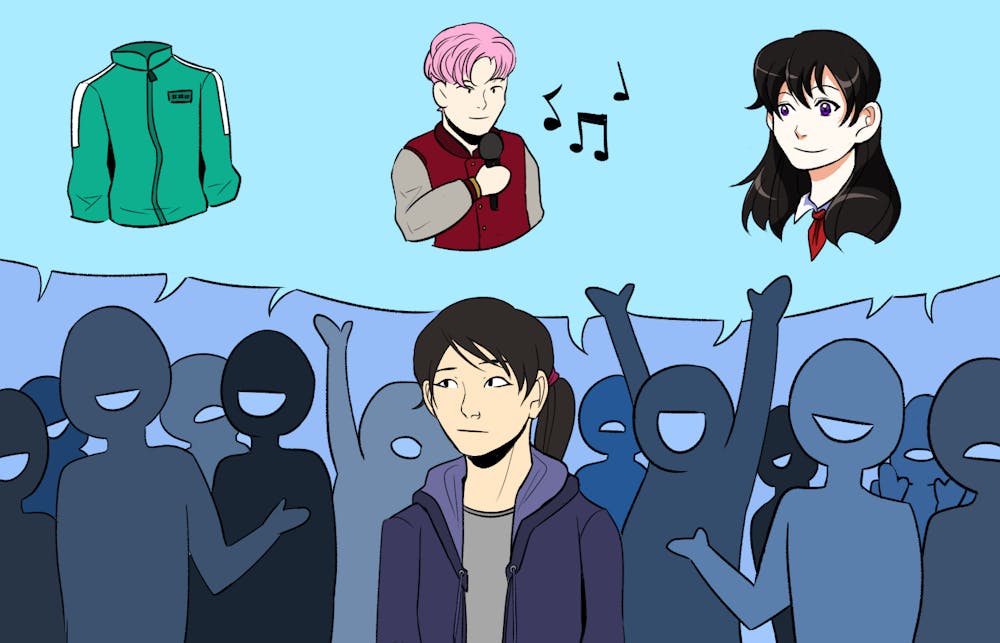In today’s society, being Asian can be great. Sometimes it seems like the days of small-eyed jokes and math nerd stereotypes are long behind me, boxed away in memories of silly primary school banter; nowadays, conversations have shifted towards the exciting action of Naruto, or how BTS’s new song was — as the Twitter stans say — a “cultural reset.”
With the rise of Chinese, Korean, and Japanese media in popular culture, the East Asian identity is now marketed as “cool” and “desirable.” Whether it was seeing “Parasite” win four Oscars last year or being asked “Have you watched ‘Squid Game’?” at least twice a day, Asian culture is trendier than ever. I will admit, seeing the cultural intricacies of my childhood not only represented but also recognized by Western society makes me feel extremely proud.
However, the hype around East Asian media is like a wave — it surges rapidly but dies away just as fast. The popularity of “Parasite” steeply declined within just a month after the Oscars — it appears that winning four Academy Awards is still not enough to sustain prolonged attention. Seeing my culture being tossed in and out of style, sometimes I can’t help but think: To Western society, am I just a trend?
Growing up in Australia, I always felt the need to assimilate. Despite speaking Mandarin at home and eating my grandma’s cooking every day, the traces of my Chinese identity stayed confined within the walls of my house. At school, I was never bullied for being “different” or “weird.” All I knew was that everyone brought sandwiches for lunch, not noodles. Everyone watched “Hannah Montana,” not “Crayon Shin-chan.” Being “white” was the norm, and I wanted to be normal.
It wasn’t until high school that I realized how deeply I had crawled into a hole of self-imposed shame. Typically, praising someone’s culture would make them feel proud. However, hearing my friends rave about how pretty idols were and how cool it was to be Chinese, I didn’t feel proud — I felt embarrassed.
As East Asian entertainment became more prominent in Western media, I also began to embrace my cultural identity. It started with baby steps, like bringing rice for lunch instead of bread, or being more open to watching K-dramas with my friends. Nowadays, I feel much more confident embracing my cultural identity, and while I love this version of myself, sometimes I wonder if I can truly claim this journey as my own.
Seeing East Asians make it big in the entertainment industry has undoubtedly pushed me to show myself — it has made me feel seen. At the same time, I must acknowledge the role that white validation has played in my life. My courage to diverge from Western norms didn’t purely stem from my love for Chinese culture — sure, that was certainly the greatest contributor to who I am today, but that love itself was not enough for me to brave the consequences of being “different.” Rather, it was Western society’s acceptance of East Asian culture as intriguing and worthy that gave me the initial push to break away from the persona I was hiding behind. White validation holds power, not just in setting trends or establishing standards, but also more intimately in our journeys toward self-love. I constantly find myself pondering a difficult question — “If Western society hadn’t embraced East Asian identities, would I have embraced mine?”
Sometimes, it feels more comforting to brush off this question — I achieved self-acceptance, so does it really matter how I got here? However, by acknowledging the role white validation plays in cultural identity, perhaps we can better understand the societal norms that prevent minorities from embracing their differences on their own. While it has been insightful to wonder if I would have embraced my identity, I find asking why I potentially wouldn’t have to be more telling of the world we live in.

Although East Asian representation has grown in the media, racial prejudice is far from being resolved. Western validation is powerful, but it is also extremely fragile; it uplifts us when we produce cinematic masterpieces but is quick to kick us back down when things go wrong. COVID-19 was a grave reminder of this: In 2020, anti-Asian hate crimes in California alone increased by 107 percent, and that’s just the ones that were reported. Globally, Asians have been physically attacked, taunted, and degraded. These events aren’t just happening between regular people on the streets — in the United States, the United Kingdom, Italy, Spain, Greece, France, and Germany, political parties have used COVID-19 to push extremist, xenophobic conspiracies that seriously endanger not only Asians, but other groups like Jewish people and refugees. While we can bask in the glory of Western recognition, we must also understand that it is conditional. We cannot live solely to please Western society; we must learn to live for ourselves.
Although I am content with who I am today, cultural acceptance is an ongoing journey. Whether it’s crying to “Your Lie in April” or simply listening to my favorite K-pop artists (Seventeen!), I have learned that I don’t need to justify my Asianness. More than that, by questioning the impacts of East Asian culture in Western society, I feel more empowered than ever to champion minority voices.
In today’s society, being Asian can be great. With the widespread growth of Asian cuisine from street food hubs in New York City to Princeton’s dining halls, East Asian representation has grown in nearly every way. Likewise, its recent surge in the entertainment industry has greatly helped people like me embrace who they are. However, it is also one of the biggest contributors to “trendy Asianness.” Nowadays, it is more crucial than ever to look past the “Asian aesthetic” that has been crafted by Western validation.
While we can still appreciate the magic of anime or K-pop, we must also accept East Asian identities beyond the ones on our screens, because my culture is more than just a trend — and so am I.

Kerrie Liang is a Contributing Writer for The Prospect at the ‘Prince.’ She can be reached at kerrie.liang@princeton.edu, or on Instagram at kerrie.liang.








